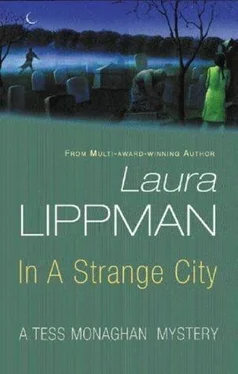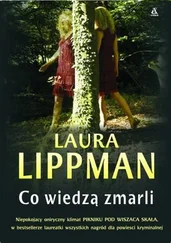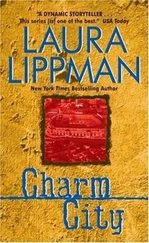She got out a sketchbook and began using an old outlining technique she remembered from her newspaper days-not a straightforward list but a series of connected circles, shooting across the page like meteors, all jumping out from the center of-well, from the center of what? The center could hold, Yeats be damned, if she only knew where or what the center was. Was it Bobby Hilliard? The deadly meeting at Poe’s grave site? The Visitor? The fake John Pendleton Kennedy? What if her fat little friend was the one who was shadowing her now? Why?
Tess was so caught up in her diagram that she jumped at the sound of a soft knock on her door, banging her knee on the keyboard tray. She glanced at the door to make sure she had thrown the lock when she came in. The deadbolt was off, but the regular lock was secure. She waited to see if anyone would knock again. It was not uncommon, in this neighborhood, for lost winos and hard-up junkies to pay after-hours visits. Seconds passed and, hearing nothing, she went back to her diagram. Then came a new sound, a sneakier sound, metal on metal. Someone was picking her lock. Slowly and clumsily, but undeniably picking her lock. This was no wino.
She took her gun out of her knapsack and eased off the safety. But the intruder would have the better view, with Tess backlit by her computer screen. She crouched behind the desk and waited.
It seemed to take forever, but at last the door swung open and feet crossed the threshold. Tess heard the door close-softly, carefully, much too deliberately for a random visitor looking for a quick buck. Tess shifted her weight, her gun in both hands, her knees tight to her chest, almost as if she were holding a yoga pose, and waited for the intruder to move toward the computer’s bright screen. Her eyes had adjusted to the dim light, but the newcomer was moving slowly, unsure of where things were in the room. Footsteps stopped and started, stopped and started until, at last, she saw a pair of khaki’ed legs come around the desk.
“What the-”
Tess, coiled like the snake in a gag can of peanuts, let loose with both her feet and caught the intruder squarely in the stomach, hard enough to knock him off his feet. She had been aiming for the groin, but she wasn’t going to argue with the results. She scrambled on top of her would-be burglar, her gun aimed at the collarbone.
“Who are you? What do you want?” she roared, with as much volume as she could muster. Tull had told her one time that yelling could not be overrated as a tool in such situations. Plus, it helped release some of the adrenaline Tess had stored while curled in a ball.
Her visitor wore a belted trench coat and a soft, shapeless hat that fell off, revealing a mass of long brown hair. The light-colored eyes showed fear, but the mouth was mean and defiant.
“If you had answered my knock, I wouldn’t have broken in,” the woman said, her tone self-righteous.
Tess pointed the gun toward the ceiling, but kept her thighs pressed on either side of her intruder’s hip bones. The thing was, she didn’t know what to do next. Search for a weapon? There appeared to be something bulky under the coat, but it might have been all flesh. Should she keep her weapon trained on the woman and then call 911? How would she do that exactly?
Discretion is not always the better part of valor. As Tess considered her options, the woman head-butted her in the chest. Even in her pain, Tess thought, Jesus, only a woman would dare do that to another woman. She fell back, still holding on to her gun, not quite clear of the woman’s body but perched on the ankles. Her mind detached, trying to discern the woman’s intent. Was this an assault or an attempt at flight?
Flight. The woman bent her knees and shook herself free of Tess, climbed awkwardly to her feet, and began running toward the door. But this was almost too easy.
With her gun in her left hand, Tess pulled on the heel of the woman’s Chuck Taylor high-top. She fell forward and Tess climbed onto her back, straddling her higher this time, so the woman’s arms were pinned, and grabbed a fistful of her hair for good measure.
“Who are you?”
The woman’s only response was a series of short, hard breaths. Tess surrendered her grip on the hair and patted her captive, somewhat inexpertly. She determined there was a gun stuck in the woman’s waistband, but couldn’t figure out how to reach under the coat without relinquishing her position. There was a billfold in the trench-coat pocket, which she could reach. She pulled it out and squinted at it in the dim light.
“Gretchen O’Brien,” she said out loud, looking at the driver’s license. There were other cards, other squares of plastic, and in a moment of inspiration Tess turned the billfold upside down and let them scatter, then threw the billfold into a corner of the room. It was harder to run when your identity was strewn across the floor.
“That your name?” she asked the back of the woman’s head as she yanked up her coat and grabbed her gun, which she tucked under her armpit. “Gretchen O’Brien?”
“You think I carry a forged Maryland driver’s license?”
“You break into people’s offices. How should I know where you draw the line?”
“Like you never broke into some place.” The woman’s voice was sneering, uncowed. Tess had to admire her attitude.
“I’ve never picked a lock,” Tess said virtuously. She preferred her glass cutter.
“Never trespassed? Never misrepresented yourself? Never used a fake business card? Never lied?”
The questions were disconcertingly knowing, as if Tess were arguing with her own conscience. She glanced at the cards strewn around her captive’s body. A Blockbuster Video card, a Visa, a Discover, a Super-Fresh savings card, all with Gretchen O’Brien’s name on them, some business cards. Soon enough, she glimpsed a less common typeface, a card identifying Gretchen O’Brien as a licensed private detective in the state of Maryland.
Tess rose and walked to the door, where she turned the key in the deadlock and pocketed it. Gretchen O’Brien would have to resign herself to being her guest for just a little longer. She turned on the light and settled in her desk chair, where she removed the cartridge from Gretchen’s 9 mm. She then picked up her.38, motioning at Gretchen to-well, do what exactly? Gretchen pulled herself up to hands and knees, then arranged herself in a half-lotus position and glared at Tess.
“The only thing you had going for you,” Gretchen O’Brien said, “was the element of surprise. You did everything wrong.”
“Everything?”
“I mean, you’re obviously not trained. There’s a reason”-Gretchen’s breath was still a little ragged, but not so ragged as to disguise the contempt in her voice-“there’s a reason the state requires people who haven’t been cops to go through a lengthy apprenticeship. Not that people like you don’t get around the law all the time. You think anyone really believes Al Keyes has anything to do with your operation here? Everyone knows he lives down the ocean in a trailer since he retired from the force, spends his days fishing.”
What could Tess say to that? It was true. “So you were a cop?”
“Yeah. I was a cop. But I figured out the free market would pay me more for my skills than the city ever would, and it’s a helluva lot safer. I’ve been doing this for almost five years now. Doing it better than you, too, judging by your setup here.”
“Is that why you broke in? To compare furnishings, exchange information about earnings?”
Gretchen O’Brien was smoothing her hair, pulling it back into a loose ponytail. She appeared to be a little older than Tess, or else her life had left more marks. Her skin tone was uneven and splotchy, her blue-green eyes had dark bags beneath them, and a sharp line on the inside of her right eyebrow seemed to have been burned in by her semipermanent scowl. But she was tall and well-proportioned, and Tess knew from patting her that her muscle tone was better than average. She probably looked pretty good when she hadn’t been on the losing side of a fight.
Читать дальше












